PROVOST REPORT 2022–2023







Chaminade University is a remarkable institution of higher learning distinguished by its faculty and its enduring commitment to an education of the whole person informed by our Marianist values. At Chaminade, our faculty represent much more than their notable credentials and accomplishments; they represent a community of educator-scholars who care deeply about their students and the community in which they serve. Indeed, when I reflect upon our faculty here at Chaminade, I am frequently reminded of the enduring words of American poet and environmental writer, Ralph Waldo Emerson: “The things taught in schools and colleges are not an education, but the means to an education.” Emerson’s words are a reflection of the unique role that our faculty play here at Chaminade—an acknowledgment that a true education is not only what our students learn with us, but what we help them to learn about themselves and take with them as they embark upon a lifetime of learning thereafter. That is the legacy that we gift to our students at Chaminade University.
In the lobby outside of my office, there is a bookcase filled with books, research and other publications authored by Chaminade University faculty members. I am very fond of this display as it serves as a constant visual reminder of my pride in our University faculty and our institution’s dedication to students, scholarship and community. Thanks to the support and collaboration of our entire University, the accomplishments of our faculty have made this a historic year for Chaminade by every measure. I am pleased to share a small portion of our University’s progress in this report, which reflects the profound accomplishments achieved through collaboration, commitment and the conviction to be a transformative force in our students' lives.
Each of Chaminade’s five academic Schools has grown in programs, enrollment and relevance to the demands of our changing world. Some of the accomplishments include: the launch of a One Year MBA program, the graduation of the first class of our Prison Education Program, full accreditation of our new Doctor of Nursing Practice degree, the addition of a new Sustainability Leadership concentration within our Doctor of Education Program, and the creation of an exciting new partnership with Kamehameha Schools to credential Native Hawaiian teachers in our local schools. In this report, you will find profiles of individuals who represent the distinctive caliber of our faculty, as well as articles that highlight innovation and community responsiveness in our undergraduate and graduate programs. These accomplishments remain in service to President Lynn Babington’s vision, “to provide a high quality and valuesbased education that prepares students to contribute meaningfully to their communities after graduation. The impact of Chaminade University extends far beyond our campus borders.”
Mahalo nui loa, Lance Askildson, Ph.D. Provost and Senior Vice President for Academic Affairs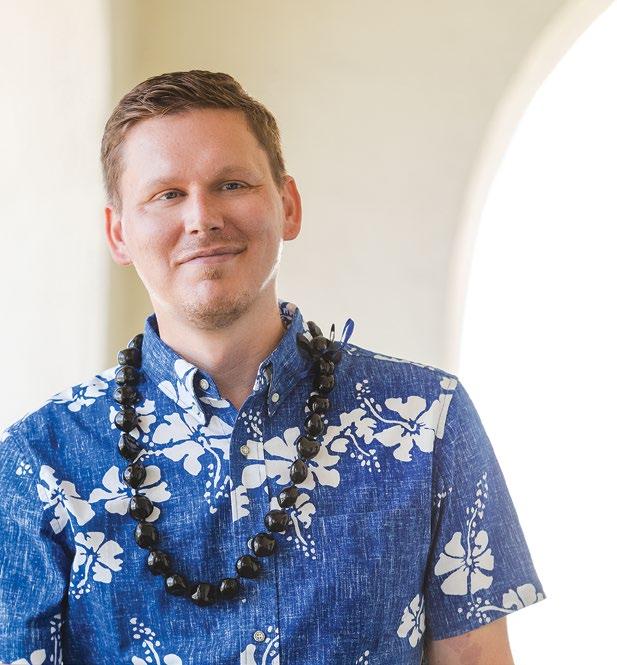
This 2023 report highlights the trends and achievements of our faculty. The greatest strength of our institution is the collective priority that we place on student learning, service and development. As we continue this important work, it is incumbent upon each of us to continue to build on the foundation of Chaminade University's rich history.

Newly restructured and expanded, Chaminade’s Office of Sponsored Programs will advance the University’s commitment through excellence in research administration, according to Dr. Claire Wright, who recently assumed the role of Senior Director with the Office of Sponsored Programs. It will also ensure that all grants are in compliance with federal, state and local regulations.
The Office’s primary and most visible mission is to serve the University community in the successful pursuit of external funds to support research and campus programs. Wright will collaborate with faculty through every step of the pre-award process to submit highly competitive proposals.
“The office helps faculty members finance the research projects that they want to do,” says Wright, who completed all of her undergraduate and graduate training in the U.K., and joined the Chaminade faculty in 2011. “This a change for me from teaching, but I want to help faculty members realize their dreams.”
Recruited by Chaminade because of her past successes in winning grants with the National Institutes of Health (NICHD) and local foundations, and her progressive translational research, Wright takes on this new role as the University develops its 2024–2029 Strategic Plan.
“Grants can help determine what the vision is for the school,” Wright says. “I’m here to help them write their grants, whatever that grant may be. And it’s not just for academic research; it could be for a study abroad program, student scholarships, community outreach or service learning. I’ll help them work through the process and their announcements, as well as with their reporting of outcomes.”
$23.4 million in total grants awarded in 2022–23
$10,000,000 National Science Foundation Grant to elevate historically underrepresented populations across Hawai'i and the Pacific Region
$600,000 federal grant from the Minority Business Development Agency to develop a Sustainability Entrepreneurship Program among Hawai'i-Pacific undergraduates
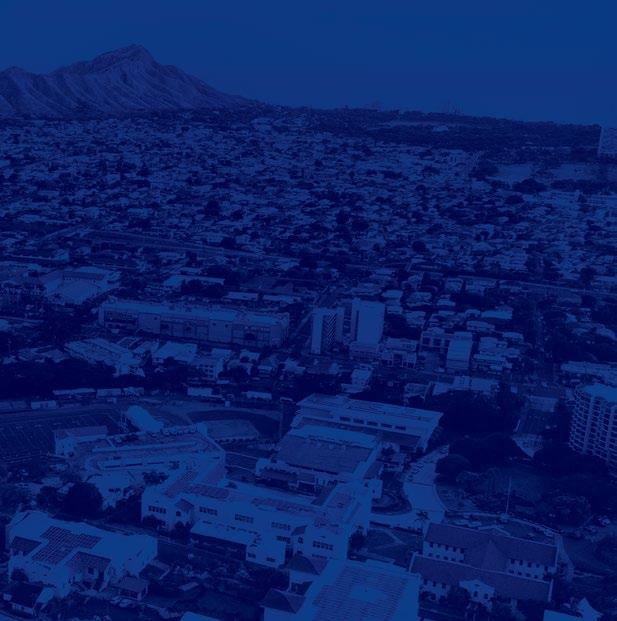
Driven by an idea, a product, a concept or a cause, faculty members conducting research or off-campus activity are often dedicated to their projects, but they might lack the experience or access to funding sources needed to effectively carry out that project. In most cases, faculty research interests require outside funding that often comes from federal and state agencies, foundation grants or fellowship programs.
“And that’s where many universities’ Offices of Sponsored Programs play a critical role,” Wright notes. “The office is the support system for faculty members who are trying to get a grant for their work in their respective disciplines.”
Since its inception in 2003, CIFAL—a French acronym for Centre International de Formation des Autorités/ Acteurs Locaux (International Training Centers for Local Authorities and Local Actors)—has continuously expanded not only in size—through the addition of new centers like this one in Honolulu—but also in depth. Currently, 32 CIFAL centers operate on every continent, from Asia and Africa to Europe and the Americas, reaching hundreds of thousands of stakeholders. In 2022 alone, the network reached 97,400 beneficiaries through 548 training and public awareness events in areas related to economic and social development, environmental sustainability and the Sustainable Development Goals (SDGs).
As the only CIFAL Center in the Pacific, the Chaminade office is part of a region that includes China, Korea, the Philippines and Australia. The CIFAL Network focuses on topics within four thematic axes: Urban Governance and Planning, Economic Development, Social Inclusion and Environmental Sustainability. Each center is locally managed by a host institution, with the United Nations Institute for Training and Research (UNITAR) providing academic content, technical support and quality assurance measures for their training activities. This allows each CIFAL to prioritize action in specific thematic axes, depending on local needs and priorities.
“We are leveraging our degree programs in Data Science, Analytics and Visualization in order to help address issues as wide-ranging as climate action, social equality and clean water, which are resonant here in Hawai'i and the Pacific,” says Chaminade Provost Dr. Lance Askildson, who also serves as CIFAL Honolulu’s board chairman. “This is a well aligned initiative for Chaminade. And so we see this as an extension of our University mission in many respects, but it is also an opportunity for us to be more intentional about our approach to sustainability and our contributions here within our local community in Hawai'i and our Pacific Island neighbors.”
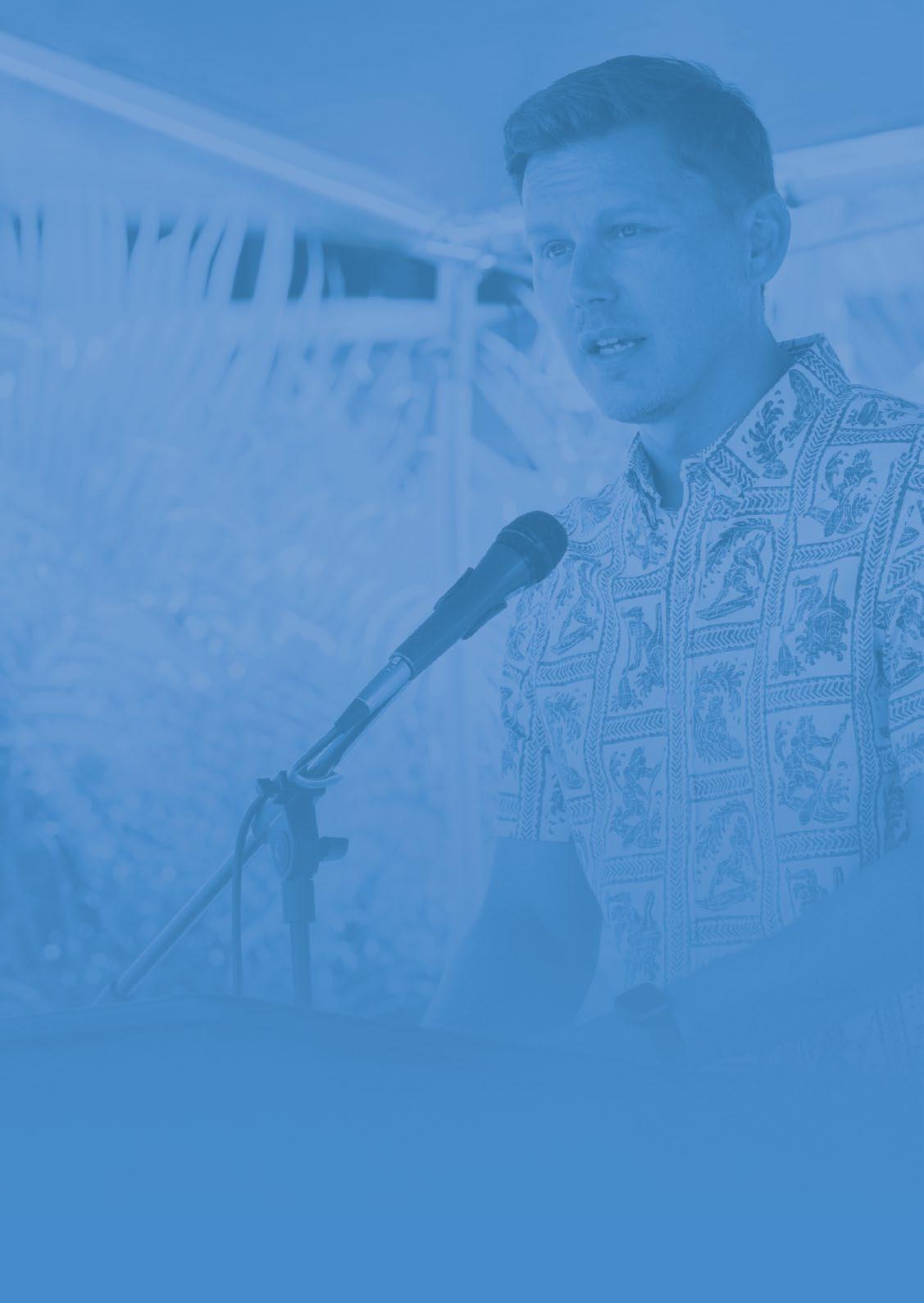
Today the CIFAL Network extends to a wide range of topics in the areas of governance and urban planning, social inclusion, economic development and environmental sustainability. Each center is committed to contributing meaningful and impactful solutions toward the implementation of the 2030 Agenda, which is a plan of action for people, planet and prosperity.
“Our role is to do what we’ve always done," says Askildson, "which is to educate young people and empower them to drive positive change.”
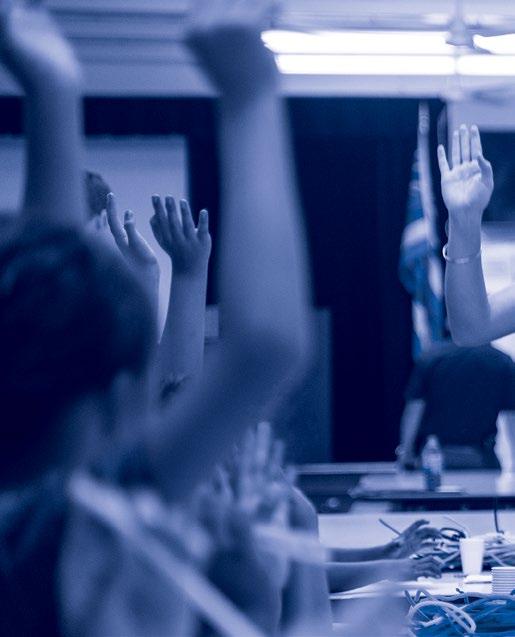
Graduations are no doubt a milestone achievement. And for seven Hālawa Correctional Facility inmates, Commencement meant even more than simply receiving their Associate’s degrees in Business Administration. The occasion truly marked a new beginning—and literally a second chance.

First established in 2015 by the Obama-Biden Administration, the Second Chance Pell Experiment was to provide Federal Pell Grants—which is the nation’s largest federal grant program for lowincome undergraduates enrolled in Title IV colleges and universities—to incarcerated individuals, allowing them to participate in postsecondary education programs. According to statistics released by the U.S. Department of Education, to date, students have earned more than 7,000 credentials, building new skills and improving their odds of success.
Chaminade Vice Provost of Academic Affairs
Dr. Janet Davidson, along with the support of many faculty members, committed to this Second Chance
program back in the Fall of 2021. And despite the challenges of COVID, Davidson was determined to see this program through its completion.
“We are proud to offer this new Second Chance program to incarcerated students at Hālawa Correctional Facility, giving them an opportunity to build their skills so they can seek to rebuild their lives,” Davidson says. “We cannot thank all our donors enough for their generous support of this program. The success of this pilot program demonstrates that community partnerships can lead to transformative change.”
With the support and guidance of Chaminade’s distinguished faculty and support staff, and the cooperation and backing of Hālawa Correctional Facility, these incarcerated individuals have embraced the opportunity to redefine their futures. This program is part of Chaminade’s mission to educate for service, justice and peace.
“We hope that with their newly gained education,” Davidson says, “these students will have the skills needed to rebuild their lives upon reintegration into society.”
Every state across the country is coming up with solutions to combat the teacher shortage, which many education officials describe as a severe crisis. For its part, Hawai'i introduced multiple incentives and retention efforts—from higher pay to student loan forgiveness—to attract new teachers, but more educators will still be needed in the near future.
To address the community’s needs, Chaminade University and Kamehameha Schools have introduced their own new carrot: an innovative and community-focused teacher prep partnership that will provide 150 Mu'o Scholarships to educate, train and prepare aspiring teachers to lead Hawai'i’s classrooms.
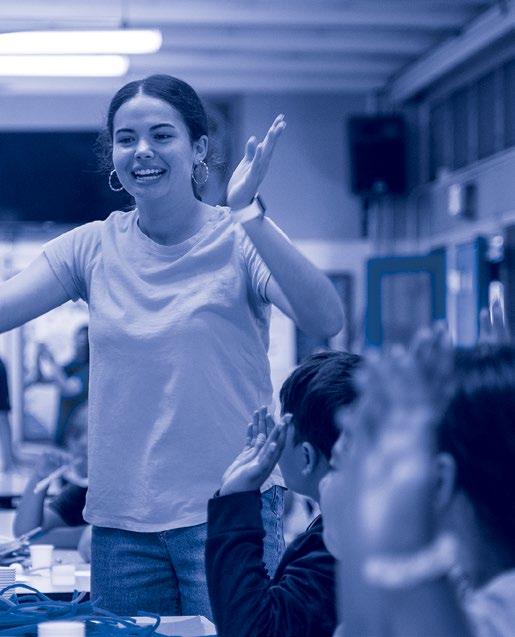
“We are excited to announce this partnership with Kamehameha Schools, which directly addresses one of our most pressing community issues: a teacher shortage,” says Chaminade University President Dr. Lynn Babington. “By providing these scholarships, we’re removing barriers that too often hinder many working adults in the state from obtaining a bachelor’s degree while still maintaining family and work commitments.”
Chaminade University’s online bachelor’s degree program is designed for working adults in Hawai'i who may already be serving as teacher's aides or in similar positions. The online delivery format will allow students to continue working while pursuing their bachelor's degrees. This transformative program is 100 percent online, with a requirement to complete a student-teaching track. Students will be paired with an academic advisor to guide them on the road to graduation.
“Access to preschool is a social justice issue for Hawai'i,” Babington says. “It has been shown that children who have experienced high-quality preschool or childcare programs are much better prepared for success in kindergarten, but unfortunately not every family has access to early learning programs.”
As a community-focused university, Chaminade has successfully partnered with local industry sectors and state agencies to identify workforce needs, which have led to the launch of several new educational, academic and certificate programs. Providing access to a high quality, holistic education to students from Hawai'i nei is central to our mission, as is transforming their lives through education.
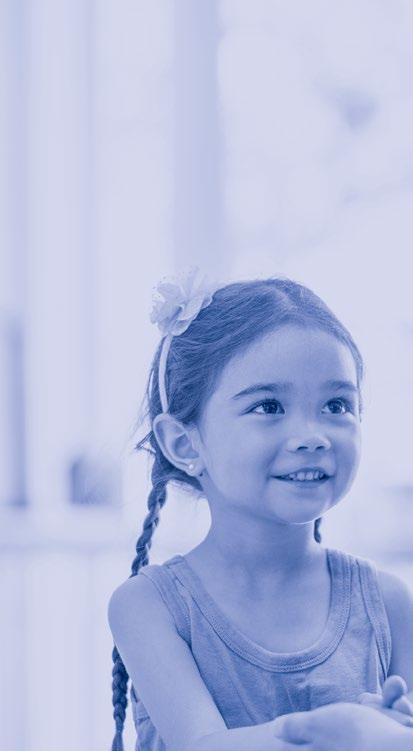

With A.I. boldly going where no technology has gone before, what was once science fiction has now become reality, thanks to computer scientists.
Chaminade’s Computer Science Major prepares students for this ever-evolving field, focusing on hands-on learning to turn theory into practice and embracing critical thinking. Students will learn how to identify, describe, and execute foundational computer organization and architecture, operating systems, computer networks and management, information systems, database systems, software engineering and programming.
Programming courses will be a key component of the curriculum for computer science majors. Students will develop skills on how to apply such programming tools as Python, Java, R, and SQL languages towards application design and development.
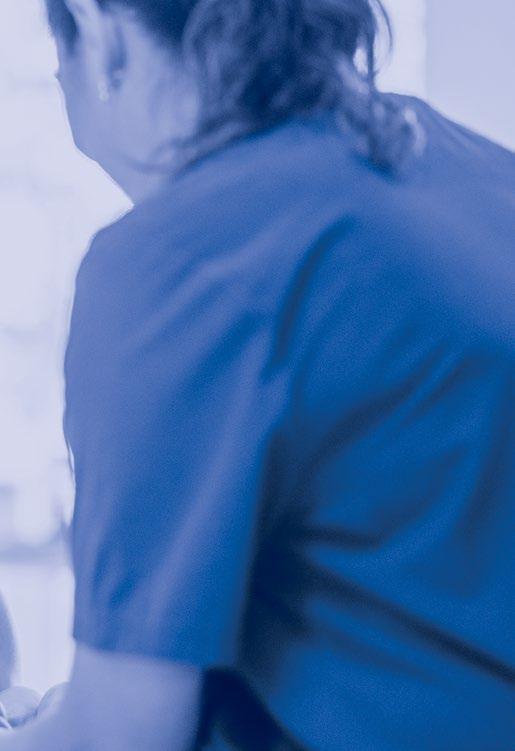
As part of an exciting partnership with the Hawai'i State Department of Education (DOE), Chaminade University welcomed its inaugural cohort for the new Doctor of Education in Educational Psychology program in 2022.
The Ed.D. program, which is offered fully online, is designed for mental health professionals serving in educational settings and driven to build their skills as leaders, mental health counselors and scholarpractitioners. Dr. Darren Iwamoto, program coordinator, said the degree’s cutting-edge curriculum includes a wealth of hands-on experiences, including around psychological test administration.
He added the doctoral program was developed to help Hawai'i meet a critical and growing need for advanced clinical professionals in educational settings. And while the Fall 2022 cohort will be restricted to Department of Education employees, Chaminade plans to open seats to the public within two years.
Students can explore a broad area of academic inquiry, studying such topics as the psychological underpinnings of learning, cognitive strategies for learning in children and adults, creating environments conducive to learning, teacher education, faculty roles and professional development in varied settings.
This program offers an innovative and real-world curriculum that focuses on preparing individuals to meet the holistic needs of PK-12 students. Emphasis is placed upon preparing individuals for transformational roles within the PK -12 school system and the community by addressing three domains:
1) Psychological Test Administration;
2) Mental Health Counseling; and
3) Scholar-Practitioner Research.
The Doctor of Education in Organizational Leadership (EDOL) program prepares current leaders to work in a wide variety of leadership roles, and to transform organizations for optimal success and growth. This program is ideal for rising executives who would like to advance their academic and professional goals. There are four distinct concentrations:
The Educational Leadership concentration prepares experienced education professionals for administrative positions in K-12 or higher education. This concentration provides a practical and dynamic setting to develop action-oriented leaders who can create person-centered learning communities and promote social justice.
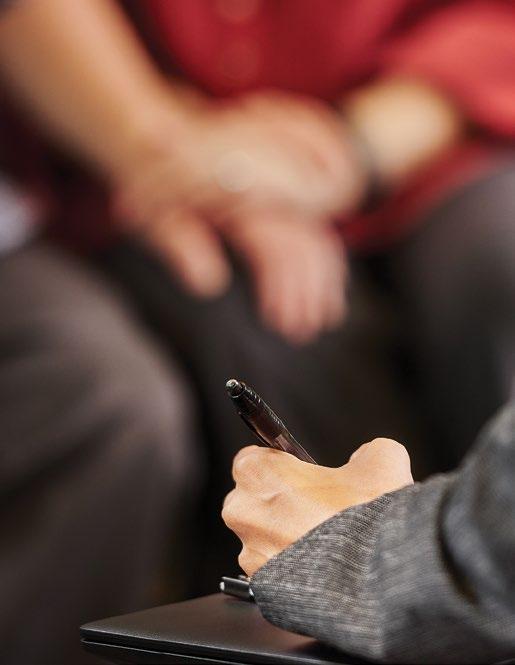

This concentration focuses on preparing leaders within indigenous populations, particularly Native Hawaiian and Pacific Islanders. Students will learn about fundamental histories, sovereignty, culturally responsive education, and how to lead and advocate across those contexts.
This track offers an interdisciplinary approach for professionals across business, healthcare, nonprofit and public sectors who are seeking to drive positive change and transform organizations for success.
The Sustainability Leadership concentration offers a multidimensional approach for professionals to develop an understanding of the challenges and opportunities involved in organizing and leading for sustainability.
In response to community needs, the School of Education and Behavioral Sciences added the Doctor of Marriage and Family Therapy (DMFT) program in the Fall of 2022, making it the first of its kind in Hawai'i. The 62-unit curriculum requires three years of full-time study for completion, taught exclusively online with synchronous and asynchronous classes.
“Hawai'i has a dearth of experts in this field,” says DMFT Program Director Dr. Blendine Hawkins. “This program is about helping the next generation of marriage and family therapy clinicians build their skills. We think with the family in mind all the time, and that’s really what sets us apart. Our prime purpose is to strengthen those connections, to honor families, to look at those areas of hurt and pain, and to help people build resilience.”
The DMFT is an advanced clinical degree program with a focus on service, justice, and peace applications to couple, marriage and family therapy. The program embodies a relational/systemic philosophy, follows the practitioner-oriented model and focuses on applied skill development for use in clinical practice, supervision, academia and administration.
Chaminade President Dr. Lynn Babington says the doctoral degree helps to meet a strong need for marriage and family therapy clinicians operating at the highest levels of the discipline. “The DMFT program is all about leadership and preparing students to take the next step in their careers so they can better advocate for families and build healthier family units, which in turn positively impacts our community,” she adds. “Service and social justice are at the foundation of this degree, aligning with our broader Marianist values at Chaminade that seek to educate the whole person and help students pursue positive change.”

Athletes may get the glory, but they don’t reach the heights of acclaim alone. Massive sporting events capture the attention of national and international audiences, thanks to the efforts of many professionals working behind the scenes, including the sports event manager, who plans the complex operations that make exciting competitions possible.
Chaminade’s Major and Minor in Sport and Event Management is built around a student’s own academic journey as a leader for tomorrow, with a strong emphasis on mentorship, experiential learning, and networking and internship opportunities. Here, students take an interdisciplinary approach to building their foundation of knowledge, with courses in sports business administration, sports psychology, sustainability, law, ethics and communication.
We’re proud to say our faculty members are all leaders in their fields, with a strong focus on entrepreneurship in Hawai'i and the Pacific. With their support, students will connect with local venues to apply what they’ve learned, and see why sport and event management can be a powerful “business for good.”
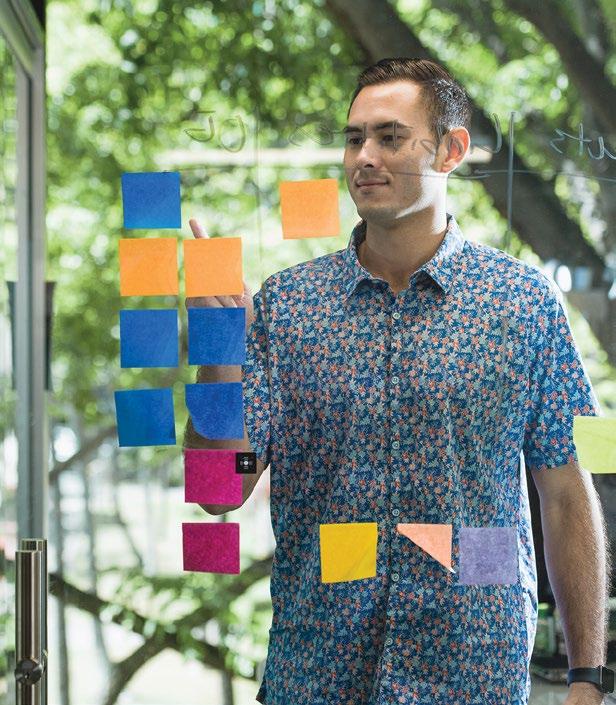
At the core of every great institution of learning is its faculty. Universities, including Chaminade, require a community of people unified by the shared objects of their love: values such as learning, truth-seeking, mutual respect, creativity and innovation, honesty and service; the rites and rituals that mark the transformative passages of collegiate life; and friendships and associations nourished by a common mission. We depend on a commitment to institutional values and its inherent tenets of integrity, service, justice and peace. Led by faculty members, Chaminade continues to make strides with its service-driven mission to educate for adaptation and justice.


Considering that 74 percent of Americans consider themselves sports fans, sport and event management is big business. However, unlike athletes, who are the face of sports, event organizers are often relegated to the sidelines. Dr. Wendy Lam hopes to change this.
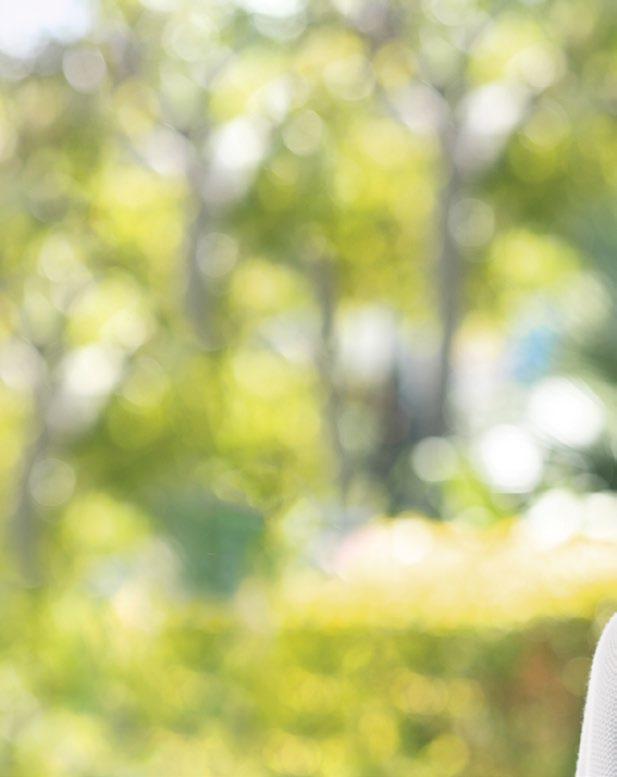
“The Sport and Event Management (SEM) program at Chaminade is the first and only SEM program in the state of Hawai'i,” says Lam, who oversees the SEM Major and Minor within the School of Business and Communication. “The Hawai'i Tourism Authority (HTA), the state agency responsible for managing tourism in the Hawaiian Islands, marketed Hawai'i as a sport destination, thus we have the unique advantage to partner with major sporting events for our students.”
World-class athletes already compete across the islands, participating in such national and international sporting events as the Sony Open, Pacific Rim Cup, Vans Triple Crown of Surfing, The Eddie Aikau Big Wave Invitational and the 2023 VinFast IRONMAN World Championship, which will be jointly held in Nice, France and Kailua-Kona, Hawai'i.
Since 1966, sport management programs in America have witnessed significant growth and increasing popularity due to enormous student interest. But unlike the physical education model of the past, today’s curriculum skews towards a more businessoriented focus.
“SPORTS PROGRAMS GENERATE TREMENDOUS VALUE TO BOTH OUR COMMUNITIES AND HAWAI'I'S ECONOMY ... I HOPE TO PROVIDE MEANINGFUL LEARNING OPPORTUNITIES FOR OUR STUDENTS AND MAKE A DIFFERENCE IN THEIR EDUCATION JOURNEY. ”
“For example, in Spring 2023, my BU 470 class worked with ClimbHI, a nonprofit organization, to plan and implement the 11th Annual LEI career fair for more than 400 local high school students at the Hawai'i Convention Center,” Lam notes. “This project allowed students to apply what they have learned while managing the changing environment and making a difference to the career development of Hawai'i’s keiki. They also have the opportunity to reach out and connect with over 50 local businesses.”
Lam predicts that the SEM Major and Minor will only gain in popularity as more students discover its availability. “The future of the school is missionfocused, practical and exciting,” she adds. “The students enjoy the classes, learn from professionals and support each other in the learning process. They will be able to apply what they have learned to make a positive impact in school, business and the wider community.”
THE SCHOOL of BUSINESS and COMMUNICATION prepares our students to become innovators and industry captains who give back to the community. From accounting to communication degree programs, our students are part of a collaborative learning community that is industryinformed and forward-looking.
Funded by the Hogan Family Foundation, the eponymous Entrepreneurial Leadership Program aims to educate Chaminade students on how to be successful in business through a series of lectures with experienced Hawai'i leaders, study abroad missions, community service projects, academic coursework and mentorship. Each year, a new cohort of undergraduate and graduate students are accepted into the one- or two-year certificate program.
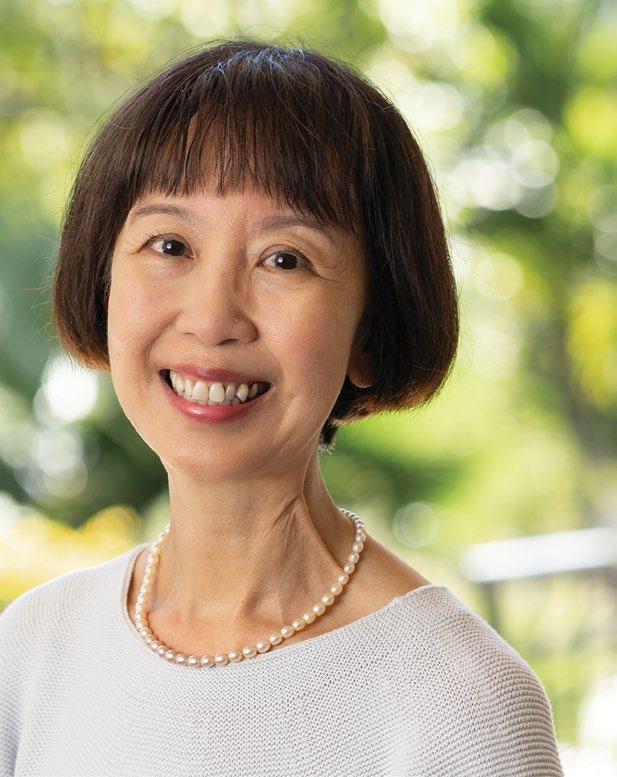
Poised to expand in the future, the Hogan Entrepreneurial Leadership Program, now in concert with the Suzie Martin & Vaughn Vasconcellos Leadership Institute, will train and mentor tomorrow’s leaders and entrepreneurs. The education that students receive will prepare them to lead with empathy, morality, compassion, and a drive to
identify problems and create scalable solutions that can benefit individuals, communities and the globe.
“My dad always liked to say, ‘Doing business things that make social sense, doing social things that make business sense,’” says Gary Hogan. “He believed in entrepreneurial practices that benefit the community.”
Hogan students have also learned another “Hoganism” known as the five Ds: Desire, Dedication, Devotion, Discipline and Determination. “Entrepreneurship is not just about starting a business, though it’s that, too,” explains Hogan Program Director, Dr. Roy Panzarella. “Entrepreneurship is about acquiring the skills of success, and we try to teach those skills in the context of entrepreneurship.”
THE SCHOOL of EDUCATION and BEHAVIORAL SCIENCES approaches learning as a lifelong process, providing rich educational experiences so graduates are not only workready, but are also productive, contributing members of their communities. Offering degrees in Psychology, Behavioral Sciences, Criminology and Criminal Justice, and Elementary Education, our graduates have the skills necessary to secure employment in many areas, and to become leaders within their communities.
Assistant Professor, Psychology
“The person is not the problem,” Dr. Blendine Hawkins insists. It’s a guiding principle that defines her work and her approach to education. Joining Chaminade in 2018, the Malaysian native is an Assistant Professor of Psychology and the Program Director of the Doctor of Marriage and Family Therapy (DMFT), which was added in the Fall of 2022 in response to community needs.
“It’s the only WASC-accredited (Western Association of Schools and Colleges) DMFT program in Hawai'i,” Hawkins says. “This first cohort included 11 students, and we’re looking at the same number when the second cohort comes in the Fall.”
Taught exclusively online, the DMFT program aims to prepare doctoral-level marital and family therapists to serve as program developers, as well as evaluatorsadministrators, and thereby promote the health and wellbeing of individuals, families and communities. The goal aligns well with Chaminade’s mission of advancing health services that attend to the whole person by developing practice-based knowledge in marriage and family therapy.
The curriculum rests on a relational/systemic philosophy, following the practitioner-evaluator model, and focuses on applied skill development for use in clinical practice, supervision, academia and administrative positions.
“DMFT candidates are already master’s-level clinicians,” Hawkins notes. “We want to prepare them to systemically intervene and address mental health disparities within families and in their communities.”
The program also assists students in integrating cultural heritage, life experience, past education and training, and personal creativity into personalized professional development plans that enable students to continue to acquire skills and competency in areas of interest.
“DMFT looks more at longterm, emotional care,” Hawkins says. “We train our DMFT students to help kids manage trauma from a decolonizing point of view, taking into consideration indigenous practices. It’s what I call the systemic/ecological perspective, which is specific to the field of Marriage and Family Therapy or Family Science.”
This first cohort of students comes from diverse educational and professional backgrounds, including in psychology, counseling, social work or marriage and family therapy. They also come from various regions of the U.S., including Tennessee, Nevada and California.
“SERVICE AND SOCIAL JUSTICE ARE AT THE FOUNDATION OF THIS DEGREE, ALIGNING WITH OUR BROADER MARIANIST VALUES AT CHAMINADE UNIVERSITY THAT SEEK TO EDUCATE THE WHOLE PERSON AND HELP STUDENTS PURSUE POSITIVE CHANGE.”

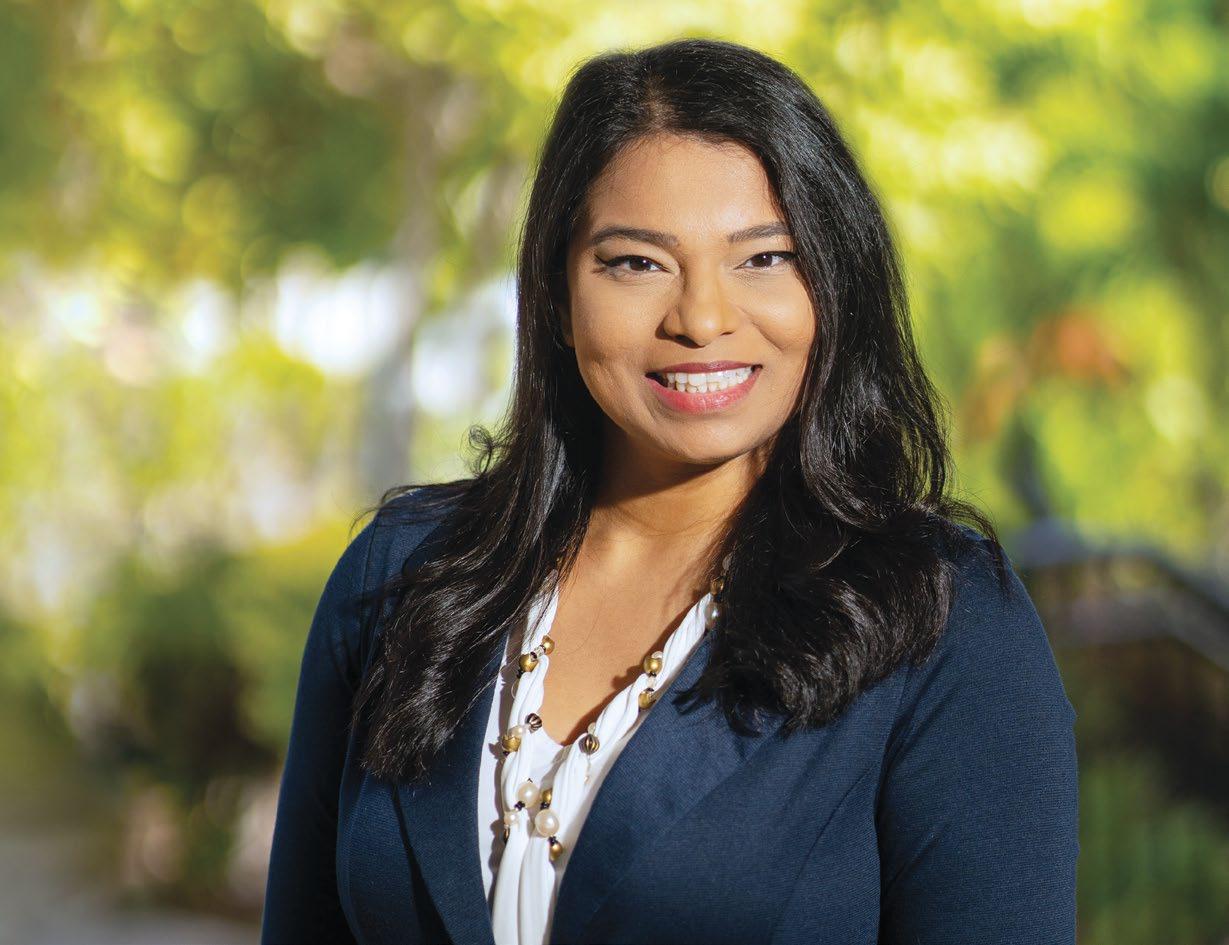
Graduates of the DMFT program will be prepared to serve as ethically competent leaders in communities, and advance the MFT profession as therapists, clinical supervisors, program developers, evaluators, grant writers, faculty in institutions of higher education and administrators. The coursework is designed to stress experiential learning, skills building and leadership development.
“The DMFT is a dynamic program that is committed to the development of the self of the practitioner,” Hawkins says. “Because we live in such a multicultural state, the curriculum is sensitive to issues of cultural context and human diversity.”
School of Education and Behavioral Sciences
Professor, Psychology
Director, Educational Psychology Director, School Psychology Coordinator, BS in Psychology
Dr. Darren Iwamoto ’98 (MS Counseling Psychology) can now add Marianist Educational Associate to his string of impressive titles. Since joining Chaminade University in 2007, Iwamoto has made a positive impact in the school’s psychology programs, helping to add six doctoral degrees in just the past couple of years. The most recent addition is the Doctor of Education in Educational Psychology program, which is in partnership with the Hawai'i State Department of Education (DOE).
“We see a community need for more school psychologists,” Iwamoto says. “And this program totally aligns with Chaminade’s values and mission.”
In 2020—the most recent year that data is available—18.4 percent of teens in Hawai'i reported
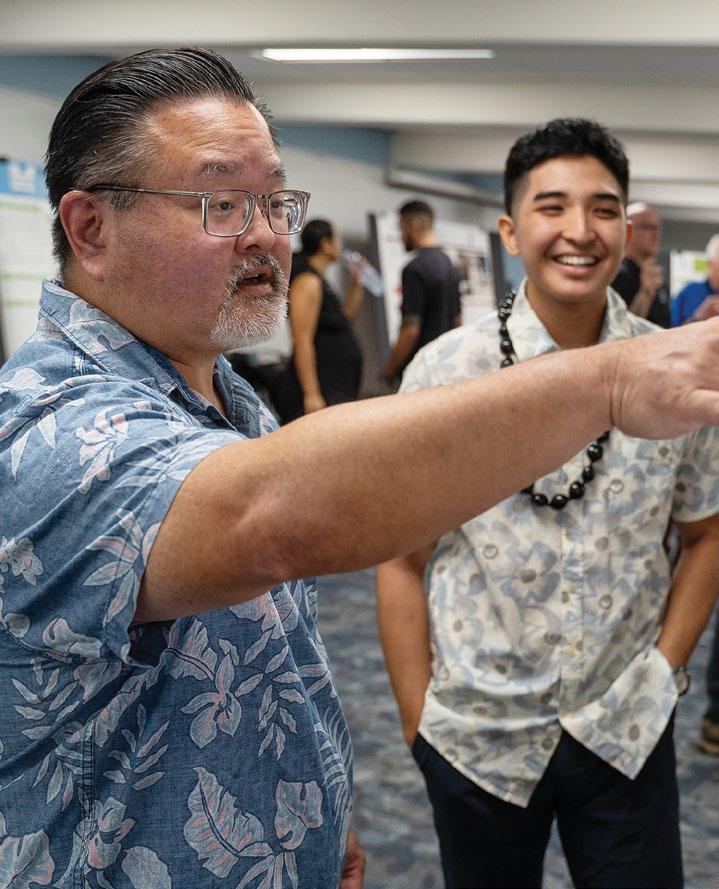
“THE DOCTORAL DEGREE PUTS A STRONG EMPHASIS ON CULTURAL AWARENESS AND CONSIDERING THE WHOLE STUDENT AS PART OF A PUSH TO BROADEN

KEY SUPPORT SYSTEMS ... IT IS ALL ABOUT HELPING STUDENTS WITH THE HIGHEST NEEDS.”
struggling with depression, up from 9.9 percent just five years prior. Despite the increase, Hawai'i falls far short of the number of school psychologists recommended by national groups. The National Association of School Psychologists, for example, currently recommends a ratio of one school psychologist for every 500 students. In 2021, Hawai'i employed 61 school psychologists— about one for every 2,800 students.
“We’re targeting that gap area—between psychologists and students—at the DOE,” Iwamoto says. “It’s important that we identify struggling students and get them on a path to academic success and mental wellbeing.”
He doesn’t assign homework. He barely lectures. He encourages his students to stand—not sit—during class. And yet Dr. Travis Mukina’s unorthodox pedagogical philosophy somehow resonates with his students. After teaching math at Moanalua High School for two years, the Pennsylvania native decided to pursue his doctorate in mathematics at the University of Oklahoma.
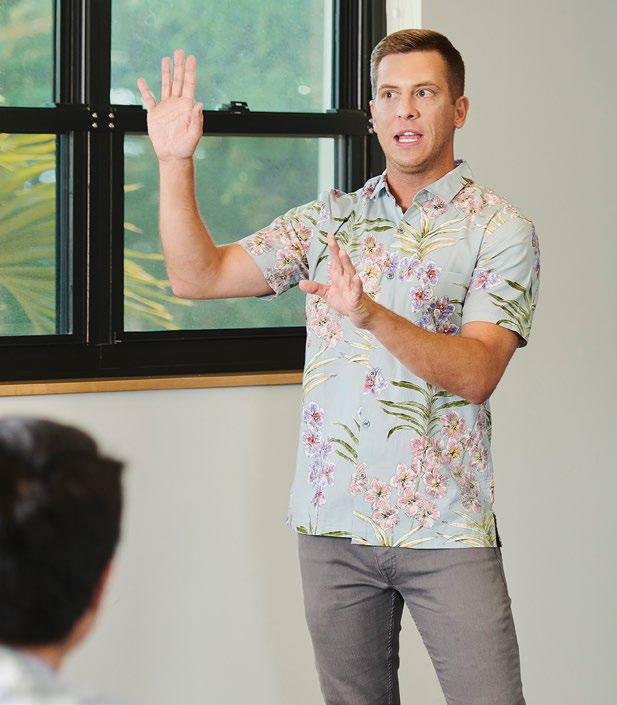
“I wanted more,” Mukina says. “So I had to leave Moanalua and Hawai'i altogether, which was the best decision I ever made.”
After earning his doctorate in 2017, Mukina returned to the islands to accept a position with the School of Education and Behavioral Sciences at Chaminade University. His goal was to “un-teach” the negative beliefs that students held towards math. Rather than “traumatize” them, he said, he eased their fears of numbers and calculations, guiding them to find their own solutions.
“I can give them one question, but embedded in that question are maybe 20 other questions,” Mukina says. “I have a Whiteboard, so students can stand around it and work together to find the answer.”
Unlike traditional math classes, Mukina says he only lectures for about 20 percent of the time and the balance belongs to his students, who can share ideas in a collaborative manner. This is when the light bulbs come on, and oftentimes, it’s not just one.
“What I love about teaching at Chaminade are the small classes,” Mukina says. “My classes range from six to 20 students, which allows me the chance to know their first and last names, and to get to know their mathematical backgrounds. It takes me two years to see them accept math positively.”
Now entering his sixth year at Chaminade, Mukina says he feels like he has come full circle.
“I left Hawai'i because I recognized that Hawai'i educators lacked a non-traditional approach to teaching math,” Mukina explains. “Students, especially Gen Z, crave this type of learning, and I wanted to be able to teach Hawai'i teachers an alternative way of getting kids excited about numbers and formulas, calculus and algebra.”
“MATH IS NON-LINEAR; IT’S MORE ABOUT FAILING THAN SUCCEEDING. ALBERT EINSTEIN ONCE SAID, ‘PURE MATHEMATICS IS, IN ITS WAY, THE POETRY OF LOGICAL IDEAS.’”
The mission of Chaminade University’s Environmental + Interior Design Program (E+ID) is to educate, engage and empower students to optimize design of the built environment as it relates to our global, multicultural, multigenerational living and working communities.
“The scope of design has expanded and is much broader now,” explains E+ID Program Coordinator Matthew Higgins. “Here at Chaminade, the program added ‘Environmental’ to the curriculum in attempt to break down barriers, and to think beyond windows and doors.”
Interior design is all about how we experience spaces. It’s a powerful, essential part of our daily lives and affects how we live, work, play and even heal. Comfortable homes, functional workplaces, beautiful public spaces— that’s interior design at work.
“Students can consider a room as behavioral space and change the mood of that room with interior design,” Higgins explains. “They can play with different materials, forms and hues. They get a really good grounding on the principles of interior design.”
Higgins also appreciates the fact that Chaminade students are working toward a BFA (Bachelor of Fine Arts) instead of a BA, distinguishing that the former demands more rigor and detail, and encompasses color theory, textiles, sustainability in design, the history of furniture and much more.
“Chaminade has the only CIDA-accredited (Council for Interior Design Accreditation) interior design program in Hawai'i,” Higgins points out. “And, if for some reason you didn’t want to stay in Hawai'i, the next closest programs are in California or Japan.”
THE SCHOOL of HUMANITIES, ARTS and DESIGN empowers our students to transcend traditional boundaries of thought and action. They become lifelong learners dedicated to personal growth, intellectual curiosity and creative passion. Armed with foundational knowledge, transferable skills and enduring experience, our graduates don’t just impact the workforce—they leave a dent.
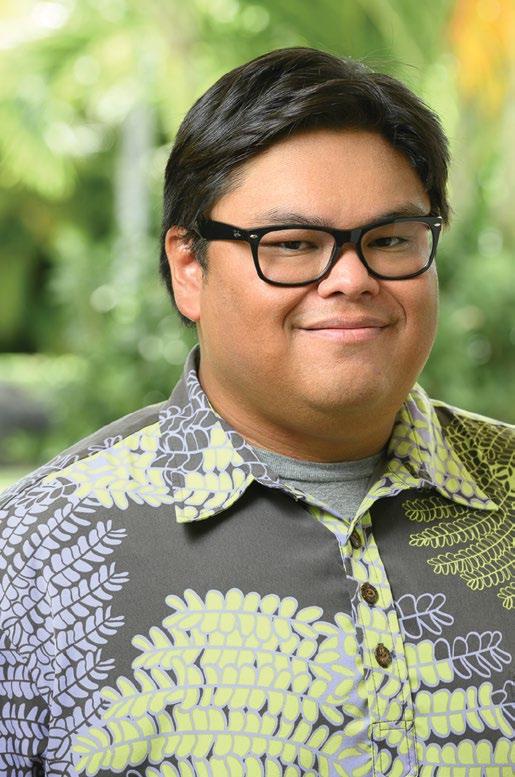
“ONE OF THE THINGS THAT I HOPE TO DO IS HELP ESTABLISH A NEW CENTER AT CHAMINADE RELATING TO THE CATHOLIC INTELLECTUAL TRADITION AND THE PACIFIC. I WANT TO EXPLORE ISSUES OF GENDER, AND COME TO TERMS WITH THE LEGACY OF COLONIALISM.”
encouraged me to go to college, where she thought I would thrive and do well.”
Black suggested Ragasa check out Chaminade University, even though his family lived on Kaua'i.
Apprehensive at first, the Kaua'i native summoned the courage and will to do what no one in his family had ever done: Attend college. His first class would set him on a path that would forever change his life.
“It was PH 105 Ethics,” Ragasa vividly recalls. “And the professor was Bro. James Christiana, whom I had as a professor every single semester while at Chaminade.”
The box that the high school system tried to put him in just didn’t fit. So Dr. Dustyn Ragasa did what most disaffected adolescents do—he quit, not having progressed beyond the ninth grade. After he floundered for a few months, lost and not knowing what to do, the Kauai teenager decided to obtain his General Educational Development (GED) diploma while also studying for the College-Level Examination Program (CLEP). But it wouldn’t be easy.
“First, I had to see a psychologist to be certified that I didn’t have a learning disability,” says Ragasa, an assistant professor of Philosophy and Religious Studies, and director of the Master of Pastoral Theology Program. “After it was determined that I didn’t have a disability, my psychologist (the late Marcy Black)
Like Black, Christiana also saw great potential in the young Chaminade student, despite Ragasa’s own trepidations and self-doubts. However, with the encouragement from Christiana and other faculty members who took their time to teach him, Ragasa excelled. He was eventually convinced to go to graduate school, which he knew nothing about.
“I asked him which school he attended, and he told me Berkeley,” Ragasa says. “He described it to me and I was like ‘OK, it’s a long shot.”
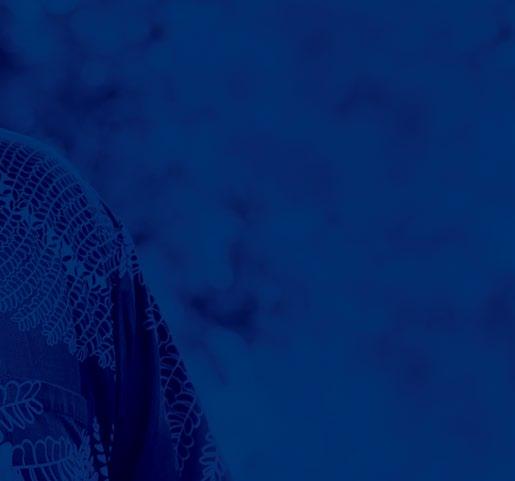
Ragasa went on to earn a master’s degree from The Dominican School of Philosophy and Theology and a doctoral degree from the Graduate Theological Union, both located in Berkeley, Calif. He said while earning his graduate degrees, he pledged to return home, and to be of service to the community and its people.
“I didn’t want people like me to be passed over just because they didn’t fit in a box,” Ragasa says. “I want to teach students to appreciate the life of the mind."
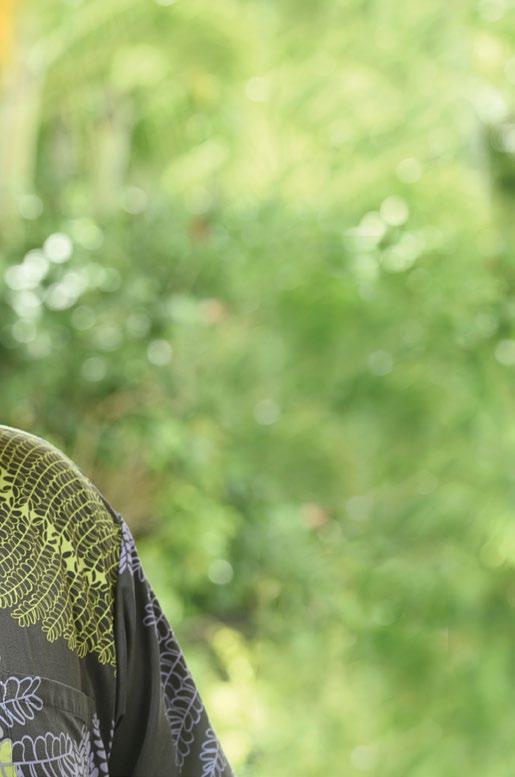
Little was known about data science when Dr. Rylan Chong was studying for his bachelor’s degree in computer science at Chaminade University. And even less was known about artificial intelligence (A.I.), at least as we know it today. Now the two are everywhere—in classrooms, in businesses, in homes, in our hospitals and even in our parks.
“Data science has so many applications, but it’s different from A.I.,” says Chong, Data Science Program director. “I consider data science as an A.I. subset that deals with data methods, scientific analysis and statistics, all used to make data more understandable and palatable.”
Growing up on Maui, Chong was more interested in soccer and video games than he was in hardware and software. After graduating from high school, he chose to attend Chaminade University, a decision based solely on his faith.
“Chaminade has always meant a lot to me,” Chong says. “I like the leadership and the University’s values align with mine.”
Recounting a time when he was volunteering in a kalo lo'i (taro field), Chong recalled that he considered not returning to Purdue to complete his master’s in information security. He was unsure of his commitment to graduate school and he missed being home.

“Then I saw these local kids toiling and pulling the taro from the lo'i, and they were so proud of what they were doing and their tradition,” Chong recalls. “And it made me think of the students and the leadership at Chaminade, and I knew I had to finish what I started.”
It is an exciting and critically important time to pursue studies in the sciences and mathematics, as we face a number of global challenges that require STEM-based solutions. At Chaminade University, students will be challenged by rigorous curricula that emphasize interdisciplinary connections, active learning and research.

“WE WANT TO ADVANCE COMPUTING AND DATA FOR SOCIAL CHANGE AND JUSTICE ... WE WANT TO WORK WITH OUR PARTNERS TO UPSCALE PEOPLE’S KNOWLEDGE IN THE USE OF DATA.”DAVID O.

Last year, he was recognized for his significant contributions to forensics by the American Academy of Forensic Sciences (AAFS). He has been asked to provide expert testimony in criminal cases across the globe. And recently, Dr. David Carter was ranked #2 among the top 20 highly prolific authors in microbial forensics of the 478 first authors counted totally, and #1 in most author citations.
Conducted by scientists from the Department of Forensic Genetics, West China School of Basic Medical Sciences & Forensic Medicine, Sichuan University, Chengdu, China, the study evaluated relevant results over the last four decades—from 1984 to 2022—all over the world, aiming to analyze the growing trends and research orientations of microbial forensics.
“I would have been only 8 years old in 1984,” Carter quips. “When I saw the rankings, I was surprised, but it was affirmation of all the hard work I put into my research.”
The ranking confirms Carter’s commitment to the forensics discipline, which he decided to pursue only after completing his undergraduate degree in anthropology from the University of Idaho. He continued his education in Bournemouth University in England, where he attained his M.Sc. in Forensic Archaeology, eventually earning a doctorate from James Cook University in Queensland, Australia.
Now in his 11th year with Chaminade University, Carter’s research in the Laboratory of Forensic Taphonomy focuses on the microbial communities associated with corpse decomposition and the estimation of postmortem interval (PMI). He holds funding from the National Institute of Justice, and serves as a grant reviewer for the National Institute of Justice, the National Science
Foundation and a number of private endowments. He has also recently published in high profile journals, including Science and eLife, and serves at the national level in the forensic science community. As the director and professor of Forensic Sciences in the School of Natural Sciences and Mathematics, Carter continues to mentor students and to prepare them for a career in forensics.
“I’ll always be a scientist,” Carter says. “One day, I’ll stop being a professor, but I’ll never stop being a scientist.”
The School of Nursing and Health Professions is literally on track to add a new Doctor of Nursing Practice (DNP) to its list of degrees. The Pediatric DNP program is designed for the registered nurse or advanced practice nurse who aims to meet the specialized physiological and psychological needs of children in the areas of health maintenance and promotion, and assessment and management of disease processes.
“In 2021, our DNP started initially with three tracks: the Family Nurse Practitioner, the Psychiatric Mental Health Nurse Practitioner and the Post-Master’s Executive Leader, which graduated its first student this past May,” explains Rhoberta Haley, Dean of School of Nursing and Health Professions. “We’ll also potentially add certificates in sub-specialties, depending on the needs of the health sector.”
Chaminade’s School of Nursing and Health Professions has come a long way since it first received approval from The Hawai'i State Board of Nursing to officially launch the University's nursing program in Fall 2010. Since the first graduating class in 2014, the School has trained more than 600 nurses who have contributed to our community’s healthcare needs in various settings.
Nurses are a critical part of healthcare and make up the largest section of the health profession. In Hawai'i, there are an estimated 1,000 current nurse vacancies, according to the Department of Labor and Industrial Relations. Hawai'i State labor data predicts there will be a growth of nurse demand of an additional 110 positions each year, through 2030.
With Hawai'i’s aging population, Haley says the need for health services will become even greater. One area in particular will be palliative care, which is specialized medical care for people living with a serious illness. The goal is to improve quality of life for both the patient and the family. The reality is that older persons do not typically have one morbidity that they are dealing with, but more that require them to seek treatment. This type of care is focused on providing relief from the symptoms and stress of the illness.
“In palliative care, patients can receive treatment for 15–20 years, and they can transition back and forth from palliative to normal healthcare or hospice if their condition worsens,” explains Haley, drawing a Venn diagram with three overlapping circles to illustrate her point. “Access to high quality palliative care is essential for all of us in Hawai'i.”
And for the past four years, Haley and her healthcare peers have talked about the benefits of palliative
THE SCHOOL of NURSING and HEALTH PROFESSIONS is committed to transforming the lives of students through an innovative nursing education that develops nurse professionals who are holistically trained to be critical thinkers, collaborators and professionals focused on patient-centered care. From certifications to BSN and DNP degrees, the School's programs are dynamic and built for changing healthcare needs. Its presence in the islands makes Chaminade synonymous with educational excellence in nursing and the health sciences.
care, leading to the formation of the nonprofit Hui Pohala, which was launched as a result of the call to action emerging from the first Hawai'i State Palliative Care Summit held in April 2020 with more than 120 diverse stakeholders.

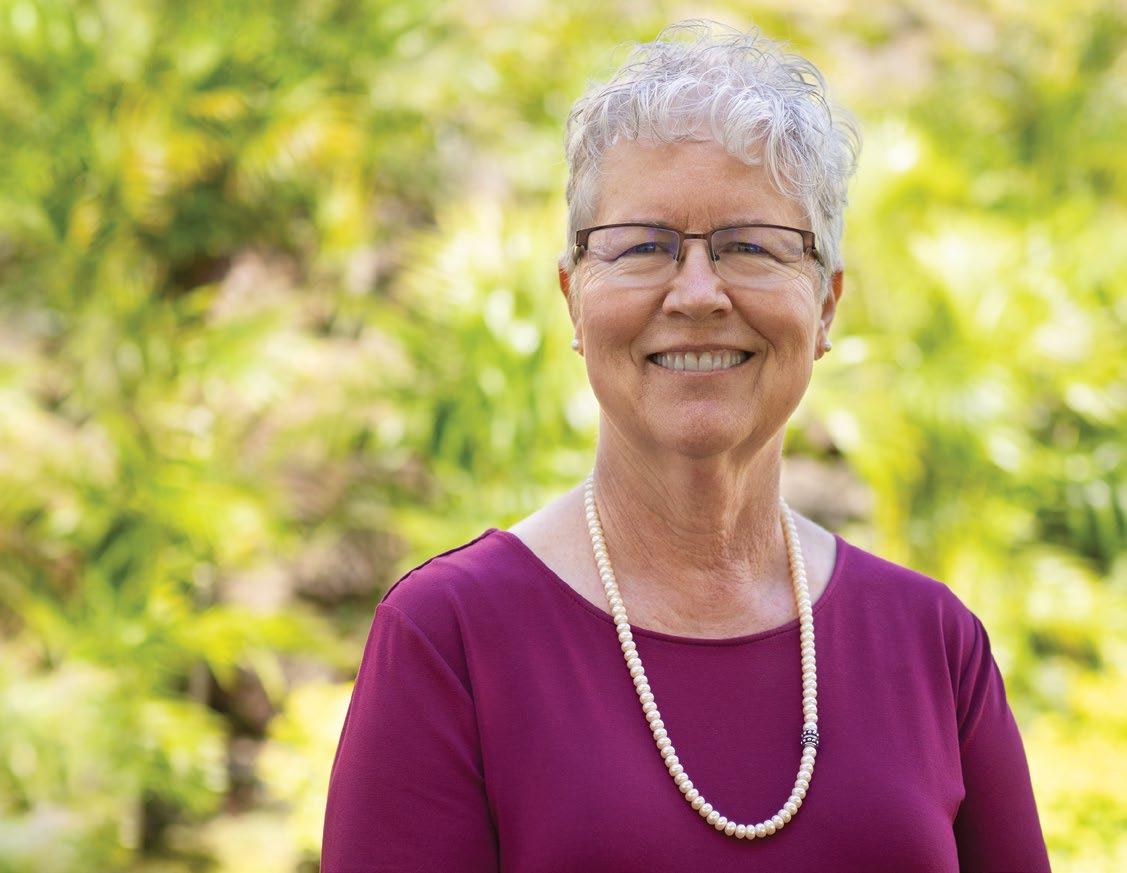
“Following the Summit, a core group of us stepped forward to build a coalition to improve access to high quality palliative care,” Haley says. “We’re hoping to do what California was the first to do: offer comprehensive palliative care insurance coverage for Med-QUEST patients in Hawai'i.”
“CHAMINADE HAS A WONDERFUL MISSION, AND NURSING IS A REALLY GOOD FIT FOR THAT MISSION. IT’S JUST A VERY NICE SYNERGY ... WE’RE POSITIONED IN A REALLY NICE WAY NOW. THIS IS THE TIME TO START ADDING PROGRAMS AND GROWING, AND OFFERING MORE TO OUR REGION.”
 Professor Clinical Coordinator & Academic Partnership Coordinator
Professor Clinical Coordinator & Academic Partnership Coordinator
Recently appointed as the Coordinator for the Community and Public Health program, Lorin Ramocki, DNP, RN, faithfully follows the words of Mahatma (Great Soul) Gandhi: “The true measure of any society can be found in how it treats its most vulnerable members.”
A dedicated healthcare professional, Ramocki spends just as much time in the classroom as she does on the streets of Honolulu, helping the most disenfranchised population from falling through the cracks. When the COVID pandemic hit, Ramocki was forced to pivot away from clinical rotations in both hospitals and community settings, and instead turned to hands-on simulations. She developed a mock homeless camp on campus, a COVID vaccination clinic, a natural disaster scenario and even an epidemiology lab to track an “unfolding case study” of a Hepatitis A outbreak.
“I try to give our students a wide breadth of hands-on experience outside of a hospital setting,” Ramocki explains. “Community and Public Health accounts for a small part of a nursing school, but it plays such a significant role in our society. And we’re now seeing a growing demand for public health nurses.”
Launched in the Fall of 2020, Chaminade’s four-year Community and Public Health degree places a strong emphasis on individualized instruction, experiential learning, service to others in the community and professional mentorship.
And unlike a hospital nurse whose role consists mostly of clinical duties during a defined period of time, the public health professional examines a person’s overall holistic health, and goes into communities to prevent disease or to help improve the population’s health for the long term.
“MY PHILOSOPHY ON TEACHING STUDENTS IS REALLY EMBEDDED IN TRYING TO INSPIRE THEM TO FIND THEIR OWN INTERESTS, AND THEN CONNECT IT BACK TO SOMETHING IN PUBLIC HEALTH AND THE COMMUNITY.”
“Our students receive a well-rounded education,” Ramocki says. “Going out into the communities opens their eyes, and they can see the impact that they have when they fulfill their service learning.”
As testament to its community work, Chaminade’s School of Nursing and Health Professions was honored with the 2023 Outstanding Partnership Award by the National Kidney Foundation of Hawaii. “We have such amazing clinical partners,” Ramocki says. “Our students get involved with so many different populations, from the elderly and children to the disenfranchised and impoverished, which helps them think outside the box and find different solutions to common problems.”
